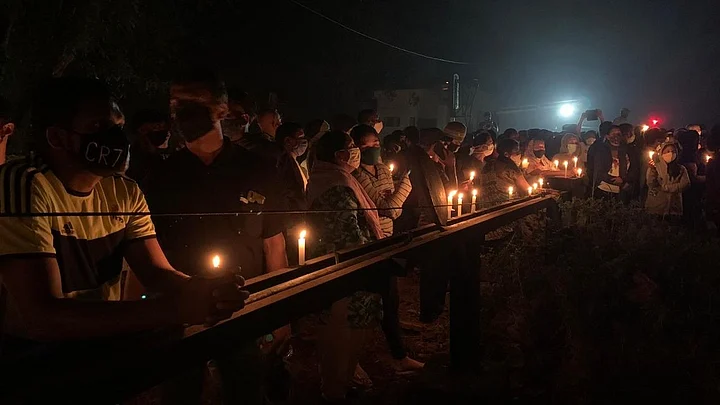Thousands of Goans came on the streets of Chandor, a south Goan town, on Sunday night, to protest various infrastructure projects planned in the state. Environmentalists have raised concerns over three infrastructure projects - a railway line, a highway and a power transmission line.
According to them, these projects will result in the destruction of 170 hectares of forest land and the axing of at least 37,000 trees. On Sunday night, the protesters gathered at the railway track and sat there until dawn since the South Western Railway was planning to start work on the railway tracks.
What Are These Projects?
The three projects in contention are the double-tracking of an old rail line from Karnataka’s Hospet to Vasco, laying down a 400-kV power transmission line, and four-laning of the existing NH 4A. These projects have been cleared by the Standing Committee of the National Board for Wildlife (NBWL) headed by Environment Minister Prakash Javadekar.
According to the South-Western railway, double-tracking will help transport of ore and coal. However, environmentalists argue that this will result in the destruction of 128.28 hectares in Western Ghats’ ecologically sensitive area and a tiger corridor.
The second project is the four-laning of an existing 12-km stretch of NH41A, which will create a link between NH-4 and NH-17 connecting Panaji to Belagavi. The project will result in the felling of over 12,000 species of trees.
Finally, the 10-km power transmission line to get the additional 400kV feed from Karnataka to meet Goa’s peak electricity demand. High-tension wires over Tambdi-Surla stream where large birds like raptors and hornbills fly, felling of 4,139 trees and other environmental issues are raised over this project.
Was it Cleared by a State Body?
According to an Indian Express report, NBWL had claimed that these projects were cleared by the Goa State Wild Life Board (GSWLB). However, some members of the state board disagreed.
The 30-member Goa State Wildlife Board, with members from various government departments, including Tourism, Fisheries, Animal Husbandry and Tribal Welfare, and 10 private members drawn from environmentalists and NGOs, had met Chief Minister Pramod Sawant, who is the board’s chairman, on 2 December 2019, when the projects were cleared.
“We were told this is a meeting to introduce everyone and discuss general matters. There was no talk of this being an environment assessment discussion or a project clearance meeting. The haphazard manner in which the meeting was done, with no discussion, rounding off proposals in less than an hour… is shocking,” environmentalist Rajendra Kerkar, one of the members, told the Indian Express.
In response to the allegation of the members, Santosh Kumar, Chief Wildlife Warden, told Indian Express: “There is no provision in the law that says a development project has to be done by plebiscite. It has to be done by the competent authority.”
(With inputs from The Indian Express)
(At The Quint, we question everything. Play an active role in shaping our journalism by becoming a member today.)
